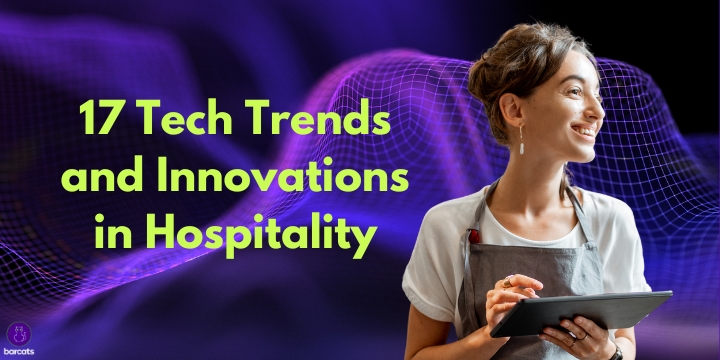17 Tech Trends and Innovations to Stay Ahead in Hospitality
May 22, 2024

The hospitality industry will only continue to be more competitive as time passes so business owners need to find more ways to stay ahead of the game. Luckily for you, we’ve got you covered with the latest trends courtesy of Hospitality Magazine and Revfine. This article summarises some of the latest innovations and ongoing trends that are shaping the future of hospitality.
Latest Hospitality Innovations in 2024
1. Foodifox
This comprehensive software and hardware solution allows caterers to prepare meals and store them in secure thermal food lockers, offering customers the convenience of picking up meals at their leisure. UNSW has successfully implemented this solution to offer students hot meals on demand, enhancing the dining experience and operational efficiency.
2. Deputy
An all-in-one platform designed to simplify workforce management. It offers features like staff rostering, timesheet approvals, and wellness checks, ensuring compliance with modern award rates. The platform allows employees to set their availability, apply for leave, and stay updated with company news, streamlining communication and scheduling processes.
3. Saucedt
This solution focuses on compliance management, covering wages, licensing, work safety, and gaming compliance. Its intuitive dashboard provides real-time insights into compliance status, helping operators address issues proactively. The platform ensures adherence to Fair Work Australia standards while optimizing workforce management.
4. Ordermentum
Ordermentum connects venues and suppliers through a digital platform, simplifying ordering and payment processes. Venues can automate standing orders, receive reminders, and manage supplier relationships efficiently. Suppliers benefit from improved cash flow, reduced administrative tasks, and personalized digital catalogs, fostering a sustainable hospitality ecosystem.
5. Doshii
Doshii integrates various hospitality apps with leading POS systems, reducing administrative tasks and improving service efficiency. It syncs orders, menus, reservations, and rostering apps with the POS system, ensuring a seamless operation and enhancing the customer experience.
6. Square
Square offers an all-in-one POS system that accepts various payment types and provides tools for inventory management, staff rostering, and eCommerce. Its flexible hardware and software solutions scale with business growth, offering transparent pricing with no hidden fees.
7. Smart Hospitality
CommBank's Smart Hospitality app transforms payment handling by integrating detailed order data from POS systems to Smart Terminals. It streamlines bill splitting, tip management, and end-of-day sales reporting, enhancing operational efficiency and customer satisfaction.
8. Qiki-Pay
Qiki-Pay offers fee-free EFTPOS with next-day settlements and no terminal rental fees. Its integration with over 700 POS systems ensures smooth transactions and operational efficiency. The platform provides 24/7 support and adds value through airline partner reward points for transactions.
Ongoing 2024 Trends in Tech
1. Artificial Intelligence (AI)
Like what we wrote in our AI-Powered Restaurants article, this trend continues to revolutionise the hospitality industry by enhancing customer service through chatbots and data analysis. It helps with revenue management by identifying trends, performing complex calculations, and making intelligent recommendations. AI's ability to personalize customer experiences based on preferences and past activities further drives its adoption.
2. Recognition Technology
Biometric recognition, including fingerprint and facial recognition, is becoming increasingly important. It offers seamless authentication for room access, check-in/check-out processes, and secure payments, improving both security and convenience for customers.
3. Virtual Reality (VR)
VR technology provides immersive experiences, allowing potential customers to explore hotels and restaurants before booking. This marketing tool enhances customer decision-making by offering a clear preview of the venue, accessible via web browsers and VR headsets.
4. Augmented Reality (AR)



